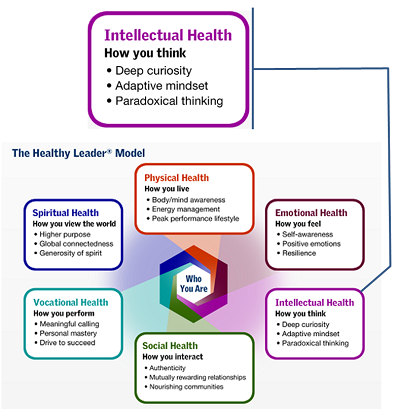When you walk in the room, who shows up for Read more →
The Leader’s Intellectual Health
Posted Friday, May 10, 2013Allen Slade
Leadership is all about plugging into the minds and of people. It is about encouraging a spirit of intellectual ferment and constructive dissent so that people are not bound by the status quo, and mavericks are given space and free play.
Kumar Birla Chairman, Aditya Birla GroupAt Slade & Associates, we create dialogue & insight for intelligent change. 
We help our clients be at the top of their mental game. To do so, we have to be at the top of our own mental game.
Being at the top of your mental game requires you to think clearly, critically and creatively in all circumstances. As a leader, intellectual health allows you to make good decisions based on solid insights. Intellectual health is also helps you drive change.
As a leader, it is essential for you to examine your own intellectual health. In the Healthy Leader® model created by Bob Rosen of Healthy Companies International, the leader’s physical health and emotional health are essential. Healthy leadership also requires intellectual health.
Modified from an image courtesy of Healthy Companies Inc.
Deep Curiosity
Intellectual curiosity, at its deepest, reaches outward and inward.
There is an external openness. The leader has a willingness to explore the unknown – seeking new situations, new data and new insights from others. When challenged, the leader wants to explore the differences.
And there is also be an internal openness to new ways of thinking. The leader is willing to challenge her own biases. The leader is willing to approach an issue with alternative perspectives.
Leaders with deep curiosity have the best questions. They go beyond asking about the facts – the who, what or where. They ask how and why. And they actively listen to the answers, curious about what is behind the other person’s thinking.
Are you deeply curious? Do you respond to challenges with openness? Do you ask powerful questions?
Or do you want just the facts? When challenged, do you defend yourself and attack the other person? Do you have more answers than questions?
I encourage you to cultivate your curiosity as a leader and to promote a spirit of inquiry among those you lead. Make extra effort to explore an issue before deciding. And, when someone disagrees with you, see that as a gift.
Adaptive Mindset
Are you intellectually agile? Do you embrace change? Do you constantly reassess your approach? Are you the first to try the new app, take the new class, meet the new person?
Resistance to change is natural, but it can also be intellectually unhealthy. Leaders need openness to change.
Even better, the healthiest leaders initiate change, starting with themselves. Bob Rosen has said “An adaptive mind is a self-transforming mind.”
As the world around us gets more complex, the rate of change is accelerating. You can increase your intellectual adaptability by deliberately embracing the unexpected. You can rewire your thinking so that you lean in to new challenges. You can hold more lightly to your current ways of thinking and acting. Growing your intellectual adaptability increases your leadership range and your managerial effectiveness.
Paradoxical Thinking
Humans often think in dichotomies: Good or bad. Us or them. Go or stop. When we think of people in two groups or cast an issue as right or wrong, we engage in simplistic thinking.
Paradoxical thinking occurs when we hold two conflicting ideas. The healthiest intellects approach a paradox with joy, expecting to be surprised and delighted.
A colleague at Ford Motor Company trained to think paradoxically by repeatedly asking: “So what’s the third alternative?” When faced with high stakes decision that has two choices. What do you do? When faced with a hard choice, a coward equivocates. A decisive leader chooses. A healthy intellect dances on the edge of the paradoxical knife.
Cognitive complexity allows leaders to expand their options. The healthiest intellects don’t boil a decision down to its simplest form. They don’t see people as (all) good or (all) bad. Instead, they keep multiple viewpoints and apparent contradictions in play longer. Paradoxical thinking leads to fewer blind spots, more quickly discarded stereotypes and better decisions. Paradoxical thinking also makes life more fun, because you see the world in color rather than just black and white.
Bottom line: Your intellectual health as a leader flows from deep curiosity, an adaptive mindset and paradoxical thinking. Your intellectual health will help you engage in dialogue and insight so you can lead intelligent change. Your organization will benefit, the people you lead will benefit and you will be prepared for the accelerating pace of change to come.



Slade & Associates this is insightful and inspirational. I think the intelligence you describe here takes place at an emotional and relational level and we need to encourage it in ourselves and others.